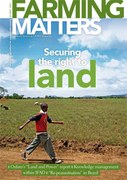Farmers’ access to land is greatly dependent on the laws and regulations on land ownership and land use in a country. But legislation is often not enough to ensure fair and equal distribution of property, whereby farmers can feel secure of their rights to the land they work. Here are some examples from different countries.
Farming Matters | 27.4 | December 2011
China: Land and bargaining power
Photo: Jorge Chavez-TafurFollowing the Household Responsibility System in China, started in the 1980s, households are seen as a production unit. Though efficient in terms of production and incomes, several years of implementation have revealed a gender bias: land rights are often in the hands of husbands and the husband’s family.
In 2002, the “Rural Land Contract” law was passed, paying special attention to women’s land rights, and ensuring women’s rights to land after they are married, divorced or widowed. Implementation of this policy has not always been easy, but now it is possible to see that, as more and more men migrate to earn off-farm money, agricultural decisions are more often taken by women.
In 2006, 39% of the land in western China was registered in the name of women, and this number is rising. The problem is that women’s bargaining power does not seem to increase with land ownership. Although a household’s income increases significantly when women own land, their own bargaining power, or even their level of participation in public activities, does not. Beyond giving access to land, improving the impact of the 2002 law means having programmes and resources that are directly aimed at women, and not just at “farmers”.
More information?
Contact Yuan Juanwen at the Guizhou College of Finance and Economics, Guiyang, China.
Email: yuanjuanwen@yahoo.com
Guatemala: “Long life to land rights!”
In the hills of San Juan Sacatepequez, Guatemala, the fight for community lands, water and forests has always been a life and death struggle. When communities organise themselves and demand recognition for their land rights against big companies (especially mines), their leaders are often harassed, kidnapped or even killed.
In February 2011, villagers in San Miguel Ixtahuacan organised a protest march in order to pressure the Guatemalan government into complying with the precautionary measures issued by the Inter-American Commission on Human Rights (IACHR) in May 2010, particularly the temporary suspension of a mine operating nearby.
Unable to get the protection of the municipal police forces, villagers had to fight hired thugs. Local organisations are therefore now calling for the services of the Peace Brigades (PB) to help protect their leaders in order to ensure the continuation of their fight. Although unhappy that “security” has become a central issue in the struggle for land rights, village leaders are happy to receive the protection and support which is needed for their leaders and their organisations to continue their fight.
More information?
Contact Gustavo Molina at the Van Hall Larenstein University of Applied Sciences, Wageningen.
E-mail: gustavoadolfo.molinaordonez@wur.nl
Tanzania: No woman’s land
Photo: Laura BernerEven though all Tanzanian land is formally state property, farmers do exert private usage rights. However, very little of this land is documented in the name of women. A decentralised system for land administration, where local village councils are authorised to document land holdings and identify landholders of un-documented plots at public land acquisition processes, was set up to benefit formerly discriminated social groups. Theoretically, this should include women.
Nonetheless, the final decisions of these local government bodies remain in the hands of traditional – i.e. male – village elders and leaders. Hence, very little of this land is documented in the name of women. Women’s weak tenure security and social capital is deeply rooted in traditional inequalities of rights between men and women.
Culturally determined gender roles limit women’s access to information and bargaining power. Additionally, constraints in terms of time, mobility and financial resources, leave them particularly vulnerable to losing out with regard to rights of tenure. Despite the positive increasing trend of documenting land holdings, real commitment to include women as land owners still needs plenty of attention. Luckily, this attention is on the rise.
More information?
Contact Laura Berner at the University of Amsterdam.
E-mail: laura.berner@email.de
Ethiopia: The right to use land
Photo: Olaf VerheijenEthiopia’s constitution protects smallholders from the risk of being evicted from the land that they work, but this has not stopped land grabs from taking place. Since all land in Ethiopia is owned by the state, it could be reclaimed without the consent of individual land users.
Since 2005, farmers are much less vulnerable to these forced evictions. The land use rights of individual farming households in the Amhara region of Ethiopia has improved considerably following the adoption of various pieces of legislation at federal and regional levels. These stipulate that farmers have a perpetual user right to their agricultural holdings, which is strengthened by issuing land use certificates and maintaining land use registers.
Moreover, two local level institutions were created to facilitate the implementation of this new legislation related to rural land administration and use. It shows that these changes have increased farmers’ security in land usage: farming households have massively started planting trees in and around their fields. Farmers are now more certain that the trees they plant for fuel, timber and fodder will be theirs in years to come.
More information?
Contact Olaf Verheijen at the Sustainable Water Harvesting and Institutional Strengthening in Amhara (SWHISA) Project.
E-mail: olafverheijen@hotmail.com

